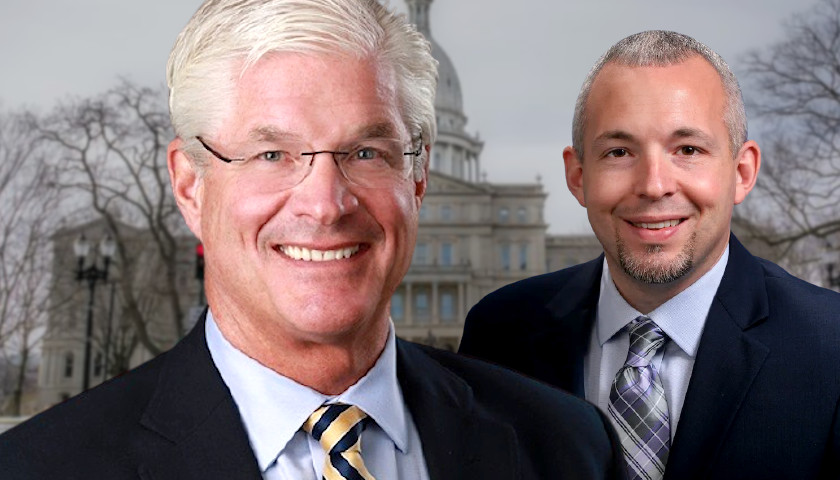by Scott McClallen
On Thursday morning, Michigan Republicans welcomed Gov. Gretchen Whitmer’s State of the State Address theme of “common ground,” but said they’re looking forward to action.
“The tone set is exactly what I think people Michiganders want to hear. But we need action and not just words and politics,” House Speaker Jason Wentworth, R-Clare, said.
Senate Majority Leader Mike Shirkey, R-Clarklake, said Whitmer not wearing her mask in the remote speech was probably the most important part.
“We need to move the state out of the state of controlling fear and one of trust and hope and opportunity,” Shirkey said. “It doesn’t mean that masks aren’t important. It doesn’t mean we shouldn’t wear masks, especially when we’re in places where people are.”
The House Republican COVID-19 recovery plan would give $363 million to districts that commit to reopening in-person instruction by Feb. 15, which is only 18 days away.
“Our goal is to get kids in the classroom as fast as possible. And I think incentivizing that goal helps schools speed that up,” Wentworth said.
The Republican plan aims to give $22 million to the vaccine process, allocated quarterly to provide extra oversight.
The vaccine rollout “isn’t going well,” Wentworth said, but the oversight would be an “opportunity to improve processes,” Shirkey added, describing the problem as “very complex.”
Whitmer’s $5.6 billion plan aims to reinstate the Good Jobs program, which Wentworth called “a slap in the face to small businesses across the state.”
Wentworth criticized Whitmer for calling injecting money into the unemployment insurance agency fund “giv[ing] tax breaks to big business,” a comment she made on Dec. 29, while advocating for the Good Jobs program, which uses taxpayer to help large businesses.
“And here she is disguising this as COVID recovery,” Wentworth said. “Good Jobs Michigan isn’t a discussion we should be having during a pandemic, during a recovery.”
One Republican bill aims to transfer Whitmer’s pandemic powers to local health departments to shut down schools.
Whitmer called it ”reckless.”
“We’re not taking away the governor’s pandemic powers or her authority to respond to the pandemic or MDDHS’s authority to respond to the pandemic,” Wentworth said, referring to the Michigan Department of Health and Human Services. “What we’re trying to do is get kids into the classroom.”
Wentworth said many remaining restrictions were “arbitrary” and questioned if Feb. 1 was a concrete date for restaurants reopening since that restriction had already been extended three times.
He called enacting restrictions on restaurant owners for months to the point where many have already permanently shut down “reckless.”
Shirkey argued restaurants had followed early restrictions, as did youth sports, but both had their restrictions extended.
Wentworth said the state should give owners restaurants owners “personal responsibility.”
“It’s not about saying, do I support 100% reopening; it’s about giving business owners the opportunity to survive,” he said. “Many restaurants aren’t going to reopen at 25% capacity.”
Whitmer’s request for $5 million to enact infrastructure in the Capitol building for banning guns completely is dead upon arrival, the leaders said, because it isn’t COVID-19 relief.
Whitmer offered nine government expansions and zero limitations, according to the Mackinac Center for Public Policy, which tracks governors’ State of the State speeches each year.
The five expansions, according to the MCPP, are:
- Permanently extending unemployment benefits from 20 to 26 weeks
- Passing the MI COVID Recovery Plan
- Permanently raising wages for home healthcare workers an extra $2 an hour
- Resurrecting Good Jobs for Michigan legislation
- Creating new ways for local governments to raise taxes for roads
“The government is throttling small businesses across the state,” Michael LaFaive, MCPP’s senior director of Fiscal Policy, said in a statement. “Asking them to pay more, especially right now, so that a few large corporations can pay less is regrettable. Good Jobs for Michigan and other taxpayer subsidies are expensive, unfair and ineffective.”
The House Republican COVID-19 recovery plan would give $363 million to districts that commit to reopening in-person instruction by Feb. 15, which is only 18 days away.
“Our goal is to get kids in the classroom as fast as possible. And I think incentivizing that goal helps schools speed that up,” Wentworth said.
The Republican plan aims to give $22 million to the vaccine process, allocated quarterly to provide extra oversight.
The vaccine rollout “isn’t going well,” Wentworth said, but the oversight would be an “opportunity to improve processes,” Shirkey added, describing the problem as “very complex.”
Whitmer’s $5.6 billion plan aims to reinstate the Good Jobs program, which Wentworth called “a slap in the face to small businesses across the state.”
Wentworth criticized Whitmer for calling injecting money into the unemployment insurance agency fund “giv[ing] tax breaks to big business,” a comment she made on Dec. 29, while advocating for the Good Jobs program, which uses taxpayer to help large businesses.
“And here she is disguising this as COVID recovery,” Wentworth said. “Good Jobs Michigan isn’t a discussion we should be having during a pandemic, during a recovery.”
One Republican bill aims to transfer Whitmer’s pandemic powers to local health departments to shut down schools.
Whitmer called it “reckless.”
“We’re not taking away the governor’s pandemic powers or her authority to respond to the pandemic or MDDHS’s authority to respond to the pandemic,” Wentworth said, referring to the Michigan Department of Health and Human Services. “What we’re trying to do is get kids into the classroom.”
Wentworth said many remaining restrictions were “arbitrary” and questioned if Feb. 1 was a concrete date for restaurants reopening since that restriction had already been extended three times.
He called enacting restrictions on restaurant owners for months to the point where many have already permanently shut down “reckless.”
Shirkey argued restaurants had followed early restrictions, as did youth sports, but both had their restrictions extended.
Wentworth said the state should give owners restaurants owners “personal responsibility.”
“It’s not about saying, do I support 100% reopening; it’s about giving business owners the opportunity to survive,” he said. “Many restaurants aren’t going to reopen at 25% capacity.”
Whitmer’s request for $5 million to enact infrastructure in the Capitol building for banning guns completely is dead upon arrival, the leaders said, because it isn’t COVID-19 relief.
Whitmer offered nine government expansions and zero limitations, according to the Mackinac Center for Public Policy, which tracks governors’ State of the State speeches each year.
The five expansions, according to the MCPP, are:
- Permanently extending unemployment benefits from 20 to 26 weeks
- Passing the MI COVID Recovery Plan
- Permanently raising wages for home healthcare workers an extra $2 an hour
- Resurrecting Good Jobs for Michigan legislation
- Creating new ways for local governments to raise taxes for roads
“The government is throttling small businesses across the state,” Michael LaFaive, MCPP’s senior director of Fiscal Policy, said in a statement. “Asking them to pay more, especially right now, so that a few large corporations can pay less is regrettable. Good Jobs for Michigan and other taxpayer subsidies are expensive, unfair and ineffective.”
– – –
Scott McClallen is a staff writer covering Michigan and Minnesota for The Center Square. A graduate of Hillsdale College, his work has appeared on Forbes.com and FEE.org. Previously, he worked as a financial analyst at Pepsi.
Photo “Mike Shirkey” by Mike Shirkey.





